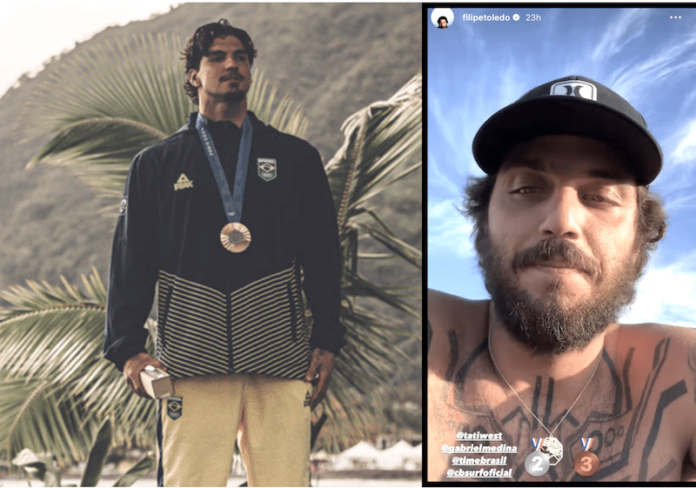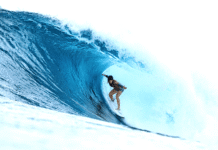
Call me delirious, tell me it’s my current sick state of mind, but if surfing has an Olympic future, it must be in a wavepool.
It came suddenly. If there was warning I did not perceive of it.
One minute I was sitting on my couch, merrily swinging away in Beachgrit’s live comment section, watching Kauli Vaast scrap with Alonso Correa in Teahupo’o conditions that did not look contestable; the next I was doubled in pain in my bathroom, expelling all liquids from my body like an exorcism.
These bouts of sickness came in waves, waves far more regular and defined than those in Teahupo’o. I shuttled between bed and bathroom, each place nightmarish in a way that will be etched in my consciousness for some time.
The bathroom, too bright, spot lit, a world of delirium ruled by a porcelain god. The bedroom, presided over by a blueish whine that would not abate. The sound of Barton Lynch and Shannon Hughes was unbearable. Neither seemed to take a breath all day, delivering monologue after monologue of high-pitched, high-energy wailing and wittering that seemed in torturous contradiction to the surfing we saw on screen. Or didn’t see.
But I persevered. Out of duty, out of penance. And in truth I don’t think I had the strength to find the remote and end the suffering.
The peak happened sometime around 5am, when I regained consciousness in the corner of the bathroom, watching beads of sweat form all over my body like thick globules of fear. My partner found me then, having been startled awake by the crashing sound. The dog, in heightened anxiety, ran from room to room before clawing frantically at the front door. I was helped back to bed, dried off with a towel, and lay down once again, as still as possible, and continued to perform my penance watching the Olympic surfing finals.
And so I lie here now, still bedridden but beyond the worst, typing on my phone.
What to make of the Olympic experience?
Kauli Vaast, local hero forevermore, took the gold medal surely one of the shortest journeys home in Olympic history. Jack Robinson took silver to Australia, Gabriel Medina bronze to Brazil.
On the face of it, this doesn’t seem like an unreasonable set of results. We know these men, in some order, are among the best Teahupo’o surfers. But the results do not tell the tale of this competition.
They won’t tell you that there was just one day of spectacular, worthy competition. And this day was one of the best days we can remember at Teahupo’o, even though it ultimately meant little.
They won’t tell you that some of the other days (including the finals) were so marginal and inconsistent that under any other banner than the Olympics, competition would not have been held.
And they won’t tell you that across two key heats, the semi between Robinson and Medina, and the gold medal match itself, supposedly the crowning heat of the whole competition, between Robinson and Vaast, a total of seven waves were attempted.
Seven waves.
Seven waves, across two heats featuring the best Teahupo’o surfers in the world.
Seven waves, between four men, over seventy minutes of competition.
Gabriel Medina, in his loss to Robinson, only attempted one wave. Anyone familiar with Medina’s talent and approach to competition understands how much of an anomaly this is.
Similarly, Jack Robinson could only find one wave whilst surfing for a gold medal.
Scandalous? Laughable? Shameful?
In this context, they shouldn’t have handed out medals at all.
Prior to this debacle I’d watched the women’s speed climbing qualification.
If you haven’t seen it, two athletes race up an artificial wall erected on a stage, tapping a pad at the top to stop the clock.
Barring slips of foot or hand, the top women do this in around seven seconds. The Polish climber, Aleksandra Miroslaw, broke the world record twice in consecutive heats yesterday, which now stands at 6.06 seconds.
The athletes look superhuman and otherworldly as they levitate up the wall. It’s highly entertaining.
There are other forms of Olympic sport climbing, all enjoyable to the layman, all seemingly fair and unequivocal in who wins or loses.
Does it reflect the culture of climbing as millions of people know and practice it? Probably not.
Are there thousands of craggy old climbers, dangling sulkily on belays, wondering why their passion has been distilled to this gaudy, artificial showcase? Highly likely.
But none of that changes the fact that sport climbing, which debuted as an Olympic sport in Tokyo 2020, at the same games as surfing, fills the role that was hoped. It’s entertaining, the rules are clear, and it’s fair.
The same cannot be said for surfing.
(But at least we got a good picture of a kickout!)
Like it or not, surfing has no future in this format. Competitions should span a single day, two at most.
Things need to change, and the Olympics was the perfect symbol. We went from one of the most glorious days of competition ever seen, surely the highlight of the games, to several days of uninteresting, incontestable surf, that even WSL weary aficionados like us can’t find interest in.
Can you imagine the viewers that tuned in on the strength of that one great day, interest piqued by gaping blue caverns, death-defying drops, and Hollywood kickouts, only to watch surfers sitting mute for half an hour?
Athletes castrated by long lulls, punctuated by knee high dribblers.
And all to the soundtrack of Shannon Hughes, telling us about “starfish dwelling on the reef”. Or Barton Lynch, breathlessly spruiking a flat horizon as if it was the single greatest thing he’s ever seen.
Perhaps it’s appropriate to the surf experience at large: one of the most iconic moments; yet the most disappointing showcase on the whole.
In the postcoital bliss of his round three report, Steve Shearer (nee, Longtom) asserted that surfing had shot itself in the foot at Teahupo’o with regards to Olympic competition. The point being, it could not get better, and future venues would never match up.
But this is the perspective of a surfer, and it doesn’t really matter if Olympic surfing appeals to surfers. What matters is that it appeals as a sport. What matters is appeal to the general audience.
The 2028 Olympics will be hosted by Los Angeles, 2032 will be in Brisbane.
So whilst I agree with premise that Huntington Beach or wavepools can never live up to the beautiful chaos of Teahupo’o, I might also suggest that it is only us who see it like that. The casual surf fan, or the Olympic surf fan, can never appreciate Teahupo’o. Nor should they need to.
Whilst we might appreciate the technical skill required to ride a barrel, just as the climber appreciates the aesthetic line up the whole mountain, what the general audience wants to see are surfers flipping and spinning on a consistent stage, or climbers racing up an artificial wall.
They don’t care about the intricacies of waves or weather. They simply want to see sport that’s consistent, fair, and relatable.
Call me delirious, tell me it’s my current sick state of mind, but if surfing has an Olympic future, it must be in a wavepool.
We’ve seen this, of course. We know that from a surfer’s perspective it’s the dullest experience possible. But we don’t really matter.
Would I be entertained by it? Would I watch it in sickness and in health? I doubt it.
But then, I’ll just watch sport climbing instead.





